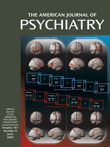Prospective Study of Neurological Abnormalities in Offspring of Women With Psychosis: Birth to Adulthood
Abstract
OBJECTIVE: The authors prospectively investigated neurological abnormalities in 75 young adult offspring of mothers with psychotic disorders and 91 offspring of comparison mothers with no psychosis history. They also studied the stability of these abnormalities from birth to adulthood. METHOD: Neurological abnormalities were previously studied in infancy and at 6 years of age. In this study, they were blindly assessed with a comprehensive neurological assessment scale at a mean age of 22.4 years in a 93.3% effective follow-up of the sample. RESULTS: In relation to the comparison subjects (N=88) and offspring of mothers with affective psychosis (N=22), the adult offspring of mothers with schizophrenia (N=28) had significantly more neurological abnormalities. More soft signs, primitive reflexes, involuntary movements, and cranial nerve abnormalities characterized a subgroup (32%) among these offspring. The offspring of mothers with affective psychosis were not different from comparison subjects. The extension of schizophrenia and affective psychosis risk groups to include additional maternal “spectrum cases” (N=10 and N=14, respectively) generally yielded similar results. Neurological abnormalities at 22 years were significantly associated with neurological abnormalities at age 6, but not in infancy, among the total high-risk group, offspring of mothers with schizophrenia, and comparison offspring. CONCLUSIONS: High levels of neurological abnormalities are found in a substantial proportion of offspring of mothers with schizophrenia but not offspring of mothers with affective psychosis. This suggests that familial risk for schizophrenia is associated with neurodevelopmental disturbance that is manifest throughout life and belongs to a different biological continuum from that of affective psychosis.



